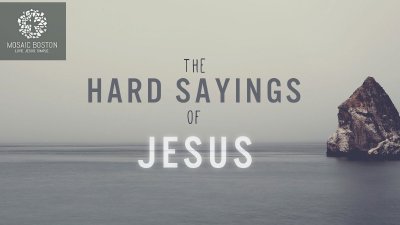


The Hard Sayings of Jesus
Do Not Judge
February 14, 2016 • Matthew 7:1–6
Today, we're beginning a new sermon series called, "The Hard Sayings of Jesus." Most of what Jesus said was absolutely clear to understand, though impossible to do (apart from the grace of God). Mark Twain spoke for many, when he said that the things in the Bible that bothered him most were not those that he did not understand but those that he understood quite well. However, Jesus did say some things, that were just perplexing. In John 6:60-61, after Jesus finishes a sermon, Scripture says that many of his disciples said: "This is hard saying; who can listen to it?" But Jesus, knowing in himself that his disciples were grumbling about this, said to them, "Do you take offense at this?" So, we're devoting the next 6 Sundays to ponder the hardest sayings of Jesus, and revealing their vast implications for our lives. Join us this tomorrow as we look at Matthew 7:1-6, and consider what Jesus means when he says, "Judge not, that you be not judged."
The Unforgivable Sin
February 21, 2016 • Matthew 12:22–37
As we continue our series through the "Hard Sayings of Jesus," we'll look at one of the most mystifying texts in all of Scripture: Jesus' teaching on the "Unforgivable Sin." Many Christians over the centuries have worried that perhaps they, unwittingly, at some point, have committed this sin. Just to calm the troubled soul of the Christian burdened by this worry: No Christian can commit this sin. If you are worried about having committed this sin, you cannot possibly have committed it. However, this doesn't mean we can just write off this text as irrelevant. I believe it has lots to teach us, including the realization of how glorious it is, that the Holy God of the Universe would forgive any of our sins, at all!! We must never get over the staggering fact, that our blasphemies and sins can be forgiven, though at such a great cost to the Lord. We also need the reminder that we can never take God's grace and forgiveness for granted. Forgiveness is not owed to us, it is gifted to us. Finally, we need to take the warning seriously, and warn those who are hardening their hearts against the Lord. What does Jesus mean when he says, "Therefore I tell you, every sin and blasphemy will be forgiven people, but the blasphemy against the Spirit will not be forgiven. And whoever speaks a word against the Son of Man will be forgiven, but whoever speaks against the Holy Spirit will not be forgiven, either in this age or in the age to come"? What is this one, unpardonable sin? How can I be sure to never commit it? What if I'm worried about having had already committed it?
Tased by Jesus
February 28, 2016 • Matthew 8:18–22, Matthew 10:34–39
One of the cardinal rules of public speaking is: "Don't be boring!" I remember a preaching professor in seminary used to say, "Preaching a boring sermon is a deadly sin!" Why? Because the Gospel is anything but boring. Jesus is the most interesting man in the world (sorry Dos Equis guy). As the most interesting man in the world, Jesus' words are the most riveting words in the history of the world. His words are so interesting because they are so scandalous! Over and over in the Gospel accounts, crowds are amazed, astonished, shocked! They marvel, they tremble, they worship. Our culture needs to be shocked by Jesus. We need to be constantly re-shocked by Jesus. We are the most entertained and pleasured society in the history of the world, and still, we're the most bored. We've grown numb to God and to each other. We need to be tased by God's shocking truth and grace.
Doubting Jesus
March 6, 2016 • Matthew 11:1–19
I don't know about you, but I think I've had my fill of the mosh-pit morass that this presidential election has become (and we've got 8 more months of it!!). As election season fatigue sets in, it's helpful to remind ourselves of who is really in charge: King Jesus! We all long for a leader who can bring true, lasting, meaningful change. We all long for a leader who is good, kind, benevolent (and honest!). Jesus is a King who has promised to usher in His Kingdom. However, his Kingdom is full of paradox and surprise. Today, we'll continue our series in the "Hard Sayings of Jesus" series, by looking at Matthew 11:1-19. The text begins with John the Baptizer, who is in prison for preaching the truth, sending his disciples to Jesus to ask: "Are you the one who is to come or shall we look for another?" This question comes as an absolute shock, because John, as a prophet of God and the cousin of Jesus, knew exactly who Jesus was. John knew that Jesus was the King come to usher in his Kingdom. Yet, John couldn't understand why Jesus, as King, would allow John to be imprisoned. His unmet expectations of the King lead to doubting his goodness and power.
Humble Chutzpah
March 13, 2016 • Matthew 15:21–28
A Canaanite woman begs Jesus to heal her sick daughter, and he responds by saying "It is not right to take the children's bread and throw it to the dogs." What?! Did Jesus just call her a dog? What just happened? This text seems utterly incompatible with the character of Jesus. It seems shockingly intolerant. Are we missing something? However, the woman isn't offended and actually responds in such a way, that Jesus says "O woman, great is your faith! Be it done for you as you desire," and the woman's daughter was instantly healed. Jesus was impressed with this woman's humble chutzpah. She accepts Jesus' words with humility, but it's not a weak humility, it's a chutzpy humility. She exhibits an audacious, confident, brassy humility. It's extremely paradoxical, but humble chutzpah is the key to a great faith that unleashes the great power of God in our lives.
Faith & Mountains
March 20, 2016 • Matthew 21:1–22
This Sunday, we are finishing our "Hard Sayings of Jesus" series with a look at Matthew 21:1-22, where Jesus rides in to Jerusalem on the occasion we have come to know as "Palm Sunday." We've chosen to include this passage in our series reflecting on the most perplexing teachings/actions of Jesus, because there's so much in this text that really seems out of place. Why does Jesus tell his disciples to just take some random person's donkeys? Further, why in the world does Jesus ride a donkey in to Jerusalem, especially if He's the Messianic King? What's up with people throwing their shirts on the ground? Palm tree branches? What's Hosanna mean (we sing it all the time, but what in the world does it mean)? Immediately after this pleasant, idyllic scene, Jesus goes to the Temple and goes berserk on the money-changers and sellers of pigeons. What?! Why are pigeons being sold in the Temple? And why such an intense reaction from Jesus? What's going on? The very next paragraph is also puzzling. Hungry/hangry Jesus goes to a fig tree, and when we saw that it had no fruit on it, he curses it. A little much, Jesus? Join us as we look at Matthew 21:1-22 and celebrate the (puzzling) Palm Sunday.


